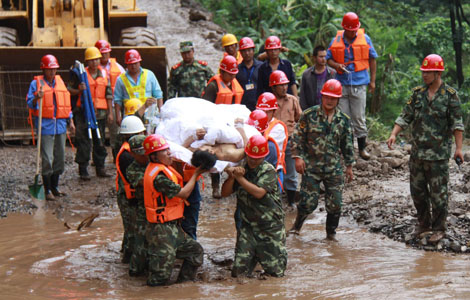 Rescuers rush an injured person to safety on Th ursday aft er torrential rain triggered mudslides in Ningnan county, Sichuan province. A massive search and rescue operation was launched aft er 40 people were feared missing. [Photo/Xinhua] |
| ?
 |
| Rescuers search for survivors after a rain-triggered mudslide in Ningnan, Southwest China's Sichuan province, June 29, 2012. [Photo/Xinhua] |
 |
| Family members react over the missing of workers after rain-triggered mudslides in Ningnan county, Sichuan province. [Photo/Xinhua]? |
Between 38 and 41 people were missing as of press time on Thursday in the aftermath of rain-triggered mudslides in Southwest China's Sichuan province.
From Wednesday night to early Thursday morning, downpours lashed Ningnan county in the Liangshan Yi autonomous prefecture of Sichuan. The heavy rains caused mudslides around 6:15 am in the Aizigou Valley, where construction workers from Three Gorges Co were staying as they worked on Baihetan Hydropower Station.
"Eight workers were rescued from the site, and 38 to 41 were missing," said Zhou Junjia, chief of the information office of Ningnan county government.
Six of the eight rescued workers had minor injuries and were treated at a hospital near the hydropower station, she said.
More than 1,000 people were searching for the missing workers, said Xu Zhiwen, deputy chief of the Sichuan Provincial Department of Land and Resources.
"After the landslides, a disaster relief group led by executive vice-governor Wei Hong headed to the site, 75 km from the county seat of Ningnan," he said.
Ningnan, a mostly mountainous county 642 km from Chengdu, capital of Sichuan, and bordering Yunnan province, has a high incidence of mudslides in the rainy season.
"Judging from experience, the missing workers have a very slim chance of surviving," Zhou told China Daily in a telephone interview. "The mud and rocks in the landslide area are unstable, and it's likely to rain more in the next three days."
Aside from the workers, there were no casualties from the mudslides. But damage was extensive.
The houses of 17 families were significantly damaged or destroyed and 133 hectares of farmland, 20 km of irrigation ditches, more than 30 km of rural highways and five makeshift bridges on highways were destroyed, said Hu Qi'an, an official of the Ningnan county flood control office.
The Baihetan Hydropower Station on the Jinsha River, a tributary of the Yangtze on its upper reaches, helps prevent floods in addition to generate electricity.
It is expected to become the nation's second-largest hydropower station, after the Three Gorges Dam, upon its completion in 2022, with an installed capacity of 14 million kilowatts.
It's construction, and that of three other hydropower stations on the Jinsha River, is part of the country's West-to-East Electricity Transmission Project. The four power stations would help retain silt to reduce sedimentation in the Three Gorges reservoir.
They will also increase water flow in the dry season to increase the power-generating capacity of the Three Gorges and Gezhouba stations in the lower reaches of the Yangtze River.
Contact with [email protected]
